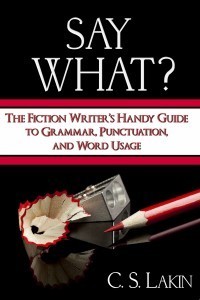Riley Adams's Blog, page 139
March 1, 2014
Twitterific Writing Links
by Elizabeth S. Craig, @elizabethscraig
 Twitterific links are fed into the Writer’s Knowledge Base search engine(developed by writer and software engineer Mike Fleming) which has over 23,000 free articles on writing related topics. It’s the search engine for writers.
Twitterific links are fed into the Writer’s Knowledge Base search engine(developed by writer and software engineer Mike Fleming) which has over 23,000 free articles on writing related topics. It’s the search engine for writers.
Freelancing–the Right Way to Write for a Living: http://ow.ly/tU6Xv @_RobbieBlair_
How To Bulk Up Your TBR List: http://ow.ly/tU6q5 @stephauteri @ploughshares
Blood-Red Pencil: I Want to Write a Book…Someday http://ow.ly/tU6C2
Choosing stronger nouns: http://ow.ly/tU6g6 @AJordon
Achieving Your Writing Resolutions: http://ow.ly/tU6q0 @krisneri @RMFWriters
10 Simple Productivity Tricks To Manage Overloaded Information http://ow.ly/tU6pR @angee
Know Your Goals: Artist-Author or Professional-Author? http://ow.ly/tU6gb @jamigold
Guest Blogging Is Dead—Long Live Guest Blogging: – Heidi Cohen http://ow.ly/tU6xR @HeidiCohen
Tips for choosing a writing teacher or mentor: http://ow.ly/tU6fZ @caroldespeaux
Why 1 writer chose to write anonymously: http://ow.ly/tU6Cd @NikkiGemmell
Persuasive Writing – Emotional vs Intellectual Words: http://ow.ly/tU6MG @amandaonwriting
11 Steps for Successful Query Submission to Publications: http://ow.ly/tU6MJ @ninaamir
What Are Those ‘Long Hyphens’ All About? http://ow.ly/tU6C1 @CSLakin
Think Like a Publisher 2014: Production and Scheduling | http://ow.ly/tU6xL @deanwesleysmith
Why We Write http://ow.ly/tU6y0 @TrueFactBarFact @writerunboxed
Story patterns/structure of different crime fiction subgenres: http://ow.ly/u5XtE @mkinberg
Authors: New Blog Topic Generator: http://ow.ly/tU6fT @wherewriterswin
Stay Safe Online While You Build Your Platform: http://ow.ly/tU6C4 @EdieMelson
Hugh Howey and the Indie Author Revolt http://ow.ly/tRqnG @markcoker
Why self-published authors should know and understand grammar: http://ow.ly/tRqnI @CSLakin
11 Types of Magazine Articles to Write : http://ow.ly/tRoNn
Publicizing a book? What to Expect… and When: http://ow.ly/tRoMA @pubsmartcon
Creative Entrepreneur: Cultivating Raving Fans And Lessons From The Music Industry: http://ow.ly/tRpn9 @thecreativepenn
Getting Serious With Serialization: http://ow.ly/tRqzC @BookWorksNYC @roncallari
The Cheater’s Way to a Viral Video: http://ow.ly/tRoNI @amandaluedeke
Archetypes vs Stereotypes: http://ow.ly/tRpmB @fantasyfaction
5 Voice Tools That Will Help You Write Better — Without a Keyboard: http://ow.ly/tRplY @thewritelife
‘My Writing Stinks! (Or does it?)’ http://ow.ly/tRqoY @kristaphillips
Writing video games: can narrative be as important as gameplay? http://ow.ly/tRqVB @gshowitt
5 Ways to Make an Author Love You http://ow.ly/tRqoK @YAMisfits
7 Quick Ways To Write Sentences That Sizzle: http://ow.ly/tRpkP @jodierennered
10 Tips for Debut Authors: http://ow.ly/tRp2Y @hannahbeckerman
New Publishing Clashes with Old: http://ow.ly/tRplv @passivevoiceblg @JanetKGrant
Using Motivation To Shape Your Plot: http://ow.ly/tRqVm @BookLaurie
Vook Acquires BookIR, Means Realistic Book Sales Data: http://ow.ly/u1aSA @vooktv @Goodereader
6 Screenwriting Pitching Lessons from the Sharks: http://ow.ly/tRjWh @scriptmag @jeannevb
Self-Publishers: Hold Yourselves to a Higher Standard: http://ow.ly/tRkw3 @gjjmcmahon
Book Reviews that Help: http://ow.ly/tRiIo @EdieMelson
On Author Earnings and Author Yearnings: http://ow.ly/u1keh @jamesscottbell
Great literary husbands: The men who supported genius: http://ow.ly/tRjVd @magiciansbook
The Introvert’s Guide to Book Marketing: http://ow.ly/tRiKZ @timgrahl
Vladimir Nabokov: Writing, Reading, and 3 Qualities a Great Storyteller Must Have: http://ow.ly/tRkcp @brainpicker
Creating an Indie Author-Bookstore Symbiosis: http://ow.ly/tRiJq @smclaugh4
Why Traditional Publishers Should Surrender To Self Publishing: http://ow.ly/tRjEG @eoinpurcell
The Best Place to Sell Books is Not a Book Store: http://ow.ly/tRkvG @CoachJudy
Publishing – We’re All On the Same Side: http://ow.ly/tRjVh @ramez
15 More Online Retailers to Sell Your Book : http://ow.ly/tRjE4 @111publishing
What tools do entrepreneurial authors need? Live chat at #EtherIssue with @Porter_Anderson going on now.
Author Earnings: The B&N Report: http://ow.ly/u1lGx @HughHowey @AuthorEarnings
More News on Authors Behaving Badly, Using Well-Known Authors’ Names as Pseudonyms http://ow.ly/u1bSy @lorcadamon
Hugh Howey: When the People of Publishing Are Set Free: http://ow.ly/u1lvu @HughHowey @Porter_Anderson
Serial Novels Get Second Life With Smartphones, Tablets: http://ow.ly/tRhgT @nbcnews @kwagstaff
How to Find Creative Inspiration: http://ow.ly/tRjDu @screencrafting
Mystery Writers–Who (or What) is Your Femme or Homme Fatale”? http://ow.ly/u19Ic”
7 Effective Ways To Quickly Improve Your Writing: http://ow.ly/tRkcS @_allisonwrites
Literary prizes make books less popular, study finds: http://ow.ly/tRkdr @guardianbooks
When Flaws Go Too Far: Avoiding Unlikeable Characters: http://ow.ly/tRiJS @angelaackerman @writersdigest
The Long and Short of Writing the Middle: http://ow.ly/tPyG1 @mooderino
Narrative Setting: How To Build A World: http://ow.ly/tPzZH @woodwardkaren
12 Surefire Signs You Really Are a Writer http://ow.ly/tPB0O @ediemelson
It Takes The Time It Takes: http://ow.ly/tPzYM @ChuckWendig
5 Ways To Write A Complex Female Character: http://ow.ly/tPB1m
10 Common Mistakes from a Literary Agency Point of View: http://ow.ly/tPA0h @jim_devitt
Indirect/Characterization: http://ow.ly/tPz3r
A character survey: http://ow.ly/tPANd
Bringing Tools of the Trade to Self-Publishing: http://ow.ly/tYeAA @mattcavnar @fakebaldur @Porter_Anderson
How to Write a Query Letter for Magazines and Other Publications http://ow.ly/tPzZe @ninaamir
Hiring the Right Editor: http://ow.ly/tPyFY @miralsattar @pubsmartcon
10 Reasons Our Hero Needs Flaws http://ow.ly/tPzp4 @angelaackerman
Why You Shouldn’t Format Your Word Docs: http://ow.ly/tPzpa @JWManus
Amtrak To Offer Writers’ Residency Program: http://ow.ly/tZXcP @huffpost
Studying author earnings surveys: http://ow.ly/tNtyi @jamigold
Becoming an Olympic Quality Writer: http://ow.ly/tNClR @jodyhedlund
How Point of View Affects Show Don’t Tell: http://ow.ly/tNzHM @janice_hardy
Before the Query: Preparing to Submit Fiction to Agents and Editors: http://ow.ly/tNCHm @WritingForward
How authors become mega-brands: http://ow.ly/tNBS2 @bbc_culture
9 Tips To Crush WriterÂ’s Block: http://ow.ly/tNBnH @ADDerWORLD
13 Reasons You May Not Be A Successful Writer… Yet: http://ow.ly/tNBsW @wherewriterswin
How to Show Instead of Tell: http://ow.ly/tNBOj @KeytopServices
Is Binge Reading the New Binge Watching? http://ow.ly/tNBYw @DennisAbrams2 @pubperspectives
Make a Post-It Note Countdown to Stick to Your Habit Plan: http://ow.ly/tNzEu
4 Points To Remember When Writing A Self-Help Book: http://ow.ly/tNBIb @writersrelief
The importance of preparing readers for shocking story events: http://ow.ly/tVuQc @JacksBlackPen
Getting to the Heart of Character Development: http://ow.ly/tNtxm
Blogging for Authors – Why 1 Writer Has Been Doing It All Wrong: http://ow.ly/tNBe6 @Windswarlock
Self-Editing–Common Errors and Easy Fixes: http://ow.ly/tVrwc @SikesAaron
5 Big Problems Facing Science Fiction Writers and How to Solve Them: http://ow.ly/tNC60 @Windswarlock
A Writer’s Voice Is All About Choice: http://ow.ly/tNzPx @BookGeekConfess
Are You Missing Opportunities to Make Your Writing Stronger? http://ow.ly/tNCwF @janice_hardy
Building a Book: Second Draft: http://ow.ly/tNCF1 @ShaunEHorton
7 Creative Lessons from Hemingway: http://ow.ly/tNz4E @mbrianorme
Pros and Cons of writing a Trilogy: http://ow.ly/tNtwW
How Minor Characters Help You Discover Theme: http://ow.ly/tNziL @KMWeiland
How to make a living as a writer: http://ow.ly/tNyWL @jaltucher
3 Secrets To Power Charge Your Writing Motivation: http://ow.ly/tNtwF @jameslrubart
How to Craft a Love Scene: http://ow.ly/tNyQW @RConstantine14
13 Browser-Based Tools For Writers: http://ow.ly/tNz0G @makeuseof
How to Become a Successful Travel Writer: http://ow.ly/tNyST @_allisonwrites
5 Strange Truths Authors Know About Productivity: http://ow.ly/tNzfI @vgrefer
5 Apps for Copy Editing: http://ow.ly/tU6WY @galleycat
Tips For Jingle Writing: http://ow.ly/tU7ll @JamesDesh23
15 attributes of an effective query letter: http://ow.ly/tU79O @bookbaby
Balancing Character Agency: http://ow.ly/tU7r2 @mythcreants
Writing for the right reasons: http://ow.ly/tU7qO @jeffgoins
Your Audience Is Unorganized: http://ow.ly/tU7qt @DanBlank @writerunboxed
Top 10 Tips for Surviving Relationship with a Writer http://ow.ly/tU7le @MargoWKelly
Are You Too Glued To Your Writing Genre? http://ow.ly/tU7qo @cateartios
Reviewing 101: http://ow.ly/tU7lh @BooksAndPals
5 Simple Tips for the Writer’s Website: http://ow.ly/tU78j @losapala
Self-Publishing Isn’t Just for Authors: Video Game Developers Do It, Too: http://ow.ly/tU7ff @vqnerdballs @BookWorksNYC
Escapism vs. Reality Check: On Creating Honest Fiction: http://ow.ly/tU7Jk @RyanCaseyBooks
Writers Block Isn’t Real: Except When It Is: http://ow.ly/tU7Jz @FebruaryGrace
5 Ways to Use Dramatic Irony in Your Writing: http://ow.ly/tU7qU @JulieEshbaugh
28 Simple Steps to Write, Raise Funds and Publish a ChildrenÂ’s Book: http://ow.ly/tU7IY @TDMBAUncles @writersdigest
Great Character: The Geek (“Sixteen Candles”): http://ow.ly/tU7Gx @gointothestory
10 Benefits Of Rejection: http://ow.ly/tVC8A @Author_JSWayne
How to write a query letter in 12 easy steps: http://ow.ly/tVFXG @amandaonwriting
Google Tips and Tricks: http://ow.ly/tVBs5 @melaniepinola
How Not to Develop Characters 101: http://ow.ly/tVBsu @beccaquibbles @diymfa
How to Finish Your Writing Projects (Even When You Don’t Feel Like It): http://ow.ly/tVC9l @joebunting
Don’t Get Screwed: The Contract Provisions Every Creative Needs to Know: http://ow.ly/tVCxd @jainspotting
Content Edits: http://ow.ly/tVBsS @writedivas @larin20
How To Create An Inspirational Workspace For Writing: http://ow.ly/tVFs7 @writetodone
Questions for Literary Agent David Gernert: http://ow.ly/tVFsO @jakonrath
The post Twitterific Writing Links appeared first on Elizabeth Spann Craig.
February 27, 2014
Creating a Production Plan
By Elizabeth S. Craig, @elizabethscraig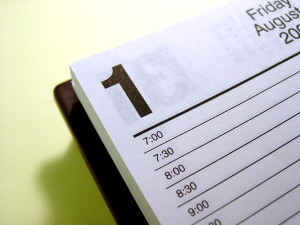
I’ve come to the conclusion that production plans are important for any prolific writer, whether they’re self-published, traditionally published, or a hybrid writer.
I was lucky enough with the deadlines for the two traditionally published series that the drafting didn’t (usually) happen at the same time. Only once that I can remember did I have two books for two different series due at once. That was…not fun.
But adding a third series into the mix meant I had even more stuff to juggle. And with self-pub, you have to add other elements onto your calendar apart from the writing: contacting your team, approving a cover, going through the editing process with a freelancer, getting the book formatted, writing cover copy…it’s a lot.
A week ago, one of the members of my self-pub team contacted me to ask when she should put me on her calendar for editing this year. This made me stop and think. Production would certainly go a lot faster and smoother and launch deadlines would become firmer if I figured out my calendar for the year, got my team onboard with my calendar, and then simply followed the schedule I’d set.
I’ve heard other writers talk about their production schedules. Writer Dean Wesley Smith recently posted on the importance of production schedules in his post “Think Like a Publisher 2014: Production and Scheduling.” Writer J.A. Marlow even offers a free writing and publishing excel template.
I know how long it takes me to write a book (usually 3 months from start to edited finish). I (roughly) know how long it takes to go through editing (usually 3-4 days for me to respond to edits), cover design process and approval (3 days usually), formatting (a day maybe).
I knew I had two trad-published deadlines this year and that I wanted to write two self-published books (possible because one of the trad-published books was handed in on Jan. 1. so only requires editing) .
I decided to make a list, as a hybrid writer, of all the things I’m responsible for doing (writing related and production related and a smidge of promo). It looks like this:
Outline (required for trad-pub, now adopted for my self-pub)
Incorporate requested edits for both trad-pub and self-pub
Teaser chapters written, frequently before entire book is finished (trad. pub)
Write back cover copy/promo copy (self-pub)
Update website with launch dates, covers, cover copy, and sample chapters
Ensure I have enough ISBNs for all formats
Contact
See if I have time to pass manuscript by beta readers
ACX up for audition after book is available on Amazon.
Proof ACX
Update bio, list of works
Create and send release newsletters to subscribers
Order proofs for CreateSpace
Upload to Smashwords, Nook, Kindle, CreateSpace.
Note releases on Facebook
Update Goodreads. Consider Goodreads giveaway. Update my Amazon Author page.
Then I set up my calendar. The trick was to schedule the tasks, keep on schedule, think ahead, and see what steps can possibly even be combined. I’ve currently turned in one trad-pub manuscript, have just finished a self-pubbed book, have outlined the next Penguin book, and am working on an outline for the next self-pubbed book now. I’ve got a cover conference with my designer at the end of March…why not just get both self-pubbed books covered at once? After all, I’ll have a completed outline for that book by then…I could just go ahead and write the cover copy and have that checked off my list.
I’m hoping that putting all of these separate steps on my calendar will help me to just automatically take care of these tasks instead of wasting time trying to remember what I need to do next…or by having to wait for my publishing team members because I forgot to contact them.
Do you set deadlines for yourself? Does it help you stay on track?
Image: MorgueFile: dhester
The post Creating a Production Plan appeared first on Elizabeth Spann Craig.
February 25, 2014
Mystery Writers–Who (or What) is Your “Femme Fatale”?
by Joe Benevento
 Anyone familiar with mystery knows the “femme fatale,” a character who can prove literally lethal to the man she seduces away from clear thinking. Bridget O’Shaughnessy in Hammett’s The Maltese Falcon is an example, presenting herself as a “damsel in distress” in need of Sam Spade’s help and protection, but ending up his ultimate distraction and potential demise (see the character played by Jane Greer in the 1947 noir film, Out of the Past for another classic rendition of the type.) In spite of our familiarity with the function of a femme fatale, not all readers or writers of fiction realize how far-reaching the concept is, how flexible, and how ultimately crucial it can be to any plot involving the kind of thinking needed to unravel a complex crime.
Anyone familiar with mystery knows the “femme fatale,” a character who can prove literally lethal to the man she seduces away from clear thinking. Bridget O’Shaughnessy in Hammett’s The Maltese Falcon is an example, presenting herself as a “damsel in distress” in need of Sam Spade’s help and protection, but ending up his ultimate distraction and potential demise (see the character played by Jane Greer in the 1947 noir film, Out of the Past for another classic rendition of the type.) In spite of our familiarity with the function of a femme fatale, not all readers or writers of fiction realize how far-reaching the concept is, how flexible, and how ultimately crucial it can be to any plot involving the kind of thinking needed to unravel a complex crime.
Some detectives avoid the danger of a femme fatale by staying away from any relationship with any woman. The list of detectives who are mistrustful of entanglements with females is a long and illustrious one. I still am surprised at how many female readers (my fifteen year old daughter among them) are huge fans of Sherlock Holmes, since Holmes himself is no fan of women. In The Sign of Four, in response to Watson accusing Holmes of being “an automaton….inhuman” because of his disinclination to notice the charms of a woman who has come to them for aid, the detective notes: “It is of the first importance not to allow your judgment to be biased by personal qualities…. The emotional qualities are antagonistic to clear reasoning.” Much later in the novel he is blunter: “”Women are never to be entirely trusted, not the best of them.” Another very popular detective, Nero Wolfe, explains to his employee Archie Goodwin, why he prefers him over a spouse: “to have you with me …is always refreshing because it constantly reminds me how distressing it would be to have someone present- a wife, for instance- whom I could not dismiss at will.” (Fer-de-Lance). Even a married detective among the bunch, Nick Charles in Hammett’s The Thin Man is retired from detective work before he marries Nora and accidentally re-involved when he reluctantly gets thrown into a new murder investigation; crime solving and domestic life do not mix in classic detective fiction. Holmes and Wolfe simply avoid women, Sam Spade or Chandler’s Philip Marlowe get involved with femme fatales, but are wary enough not to be undone by them.
Of course this mistrust of women and particularly their sexuality can probably be traced all the way back to the Garden of Eden and the attempt to blame Eve for Adam’s own bad decision making. In fact, Umberto Eco in The Name of the Rose, codifies this tradition for all readers of mystery when he has the monk Ubertino explain to the young narrator why a woman falsely accused of witchcraft is still essentially guilty: “If you look at her because she is beautiful and are upset by her… if you look at her and feel desire, that alone makes her a witch.” Eco’s novel , set in medieval times, reveals the femme fatale as a by-product of men’s own misplaced carnal desires.
The idea of always making a woman the threat to a detective’s equilibrium has become not only tired but also distasteful to a large portion of the reading public, so mystery writers have made adjustments. Sue Grafton is one of the most popular writers of contemporary detective fiction. (She’s presently all the way up to W in her letter by letter mysteries featuring female detective Kelsey Milhone). It is far from coincidental that in her very first book, A Is for Alibi, her detective finds herself entangled with a suspect-become -lover, who essentially serves as her “homme fatal.”
While having a male equivalent is one way to freshen the trope, sexual distraction is not the only option, as a detective can be dissuaded from clear thinking and concentration by a variety of factors: say, his or her checkered past or an ongoing drinking problem. For example, Jim Chee in Tony Hillerman’s very successful novels set in Navajo territory not only is sometimes distracted by his various romances, but also by his devotion to Navajo culture, which more than once collides with his ability to concentrate on the case at hand. In A Thief of Time, for example, Chee is less than methodical in his investigation of a crime scene because the proliferation of human bones at the site makes him want to flee because of their especially threatening values within his religion.
Still, while writers like Conan Doyle and Rex Stout got around the femme fatale by having their heroes be immune to her, if you are presenting your protagonist as a “normal human being,” you are going to have to address the question of relationship and how it will affect your hero’s ability to detect. In Lehane’s Mystic River, Sean Devine’s distraction is the wife who cheated on him and left him. Interestingly, though it is the wife who has been unfaithful, eventually the husband seeks forgiveness, and mostly because we are asked to understand that his attempts to be a traditional tough, emotionless cop are what ruined his relationship with his wife in the first place. The blame is no longer placed on the woman for attracting the man but on the man for his attempt to be emotionless.
In creating a detective it isn’t only important to show how he or she is smarter or stronger or more resourceful than most others, but also what his or her “femme fatale” may be, what weakness, what bias, what attraction that challenges the ability to detect. Even Holmes and Nero Wolfe are not immune to this rule; though women cannot seduce them, Holmes has a problem with cocaine and Wolfe a strong disinclination ever to leave his home. And while we have graduated from Holmes’s categorical dismissal of all women, no protagonist, however brilliant or tough or idiosyncratic, will be fully compelling without a weak point, a humanizing characteristic to challenge that considerable ability.
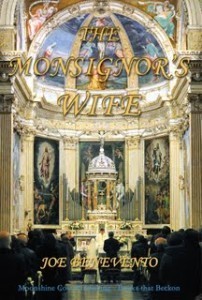
Joe Benevento’s first mystery novel, and ninth book of poetry and fiction over all, The Monsignor’s Wife, came out in September of 2013 with Moonshine Cove Publishing. For more information go to:www.AuthorJoeBenevento.com
The post Mystery Writers–Who (or What) is Your “Femme Fatale”? appeared first on Elizabeth Spann Craig.
February 23, 2014
Self-Editing–Common Errors and Easy Fixes
by Aaron Sikes, @SikesAaron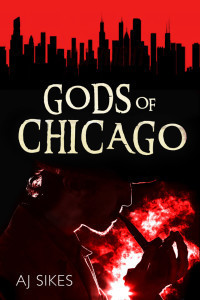
Many thanks to Elizabeth for hosting me today. My noir urban fantasy, Gods of Chicago, is currently on tour. Since I’m also an editor, Elizabeth asked me to share some tips for self-editing. If all you’ve heard is the (mistaken) advice that good writers never self-edit, then this post should help dispel the misconception (I hope it does at any rate). If, on the other hand, you’re well steeped in the self-editing tradition, then I’ve got my fingers crossed that I can share some new ideas. Please add your suggestions in the comments, too!
Basics of style
The first editor I worked with gave me a valuable lesson in tightening my prose, beginning with the elimination of the verb to be from my MS. This, like all rules regarding exclusion, should not be viewed as a hard and fast proscription. However, the ‘be’ verb works best when it is limited to those instances where no other verb fits the bill. If you can use another verb in place of the ‘be’ verb, your prose will improve and your readers will thank you.
‘Be’ is stative, not descriptive; compelling prose relies upon description to elicit responses and engagement from the reader. If you’ve been accused of telling rather than showing, the ‘be’ verb is probably the culprit.
1) Emma was transfixed. (telling, stative)
2) Emma’s mouth hung open and she stood frozen in place. (showing, illustrative)
Crutch phrases
We all have them. Those phrases that automatically populate our manuscripts, starting paragraphs during action sequences or opening new chapters, transitioning from one stage of a scene to the next. My guilty pleasure is using ‘as’ to indicate action. I see it happening in my head, so I end up writing it as though it were taking place at that very moment.
1. As Brand stepped through the doorway, he felt eyes on him and heard the click of a hammer being pulled back. He dropped to the floor and the bullet hit the doorjamb just above his head.
The first problem with this phrasing (for me anyway) is that I use it far too often. But from an editor’s standpoint, the critical problem is one of clarity and immersion in the story. The reader is being asked to focus on too many details in that first sentence. That means their eyes will likely pass right over it, not really absorbing the action. Sometimes we want the reader to barrel along through a scene, and that’s fine. But it takes a different kind of phrasing to create the tension and suspense of hearing your own death ratcheting back one click at a time.
2) Brand stepped through the doorway and let his foot hang above the floor. He felt eyes on him from somewhere in the darkened room. When he heard the click of a hammer being pulled back, Brand dropped to the floor. The bullet hit the doorjamb just above his head.
Redundancies and how to avoid repeating yourself or saying the same thing twice
Let me get my tongue out of my cheek here.
When it comes to redundancy, I can’t point to specific words or phrases that you’ll want to watch out for. But I can suggest you keep a notepad handy. Get in the habit of writing down any words you notice appearing more than once in your MS. For me, this amounted to the following list:
stumble/d, second later/moment later, huddle/d, hunker/ed, tears, crying, cried, scream/s/ed
I had my characters stumbling, huddling, hunkering, crying, and screaming ad nauseum. It wasn’t until I spotted ‘stumble’ twice in the same scene that I caught on and combed through for redundant verbs (you’ll notice that nearly all my offenses were, um, verbal). Like crutch phrases, we all have crutch verbs. Jot them down and do a full search for each one as part of your self-editing. Your prose will improve and grow tighter.
Related to redundancy is a common error we all make: duplicated words. You’ve seen them in published books and fear that you’ve left them in your MS waiting to jump out on unsuspecting readers. Instances of the the, or that that. For some reason, the and that are frequently doubled. It may be the result of a stop-start moment in our writing. With that, we may have two sentences running through our head at once, since we’re using a relative pronoun. Whatever the cause, save yourself the embarrassment and do a full search for the the and that that.
One other note on addressing redundancies. Use Scrivener or another program designed for authors. The search feature in Scrivener, for my money, makes handling revisions and self-editing almost enjoyable. Instead of endlessly clicking the “Find Next” button, you simply enter the term in the search window and get to see a list of chapters or scenes in which the searched for term appears. This becomes a nice little game of crossing things off a list as you tidy up each scene.
Aural interference
Watch out for common misspellings (teh, thta) and common confusions (form/from and the addition of a plural ’s’ before the verb ‘is’). These happen when our minds are working faster than our fingers. We hear (in our minds) the ultimate ’t’ in that, and our fingers type that letter before the preceding vowel. We mean to type from, but end up typing form instead, or vice versa. We’re going to use the ‘be’ verb (because no other verb works better in this particular instance) and we hear that ultimate voiced sibilant as we’re typing the preceding word, so that word ends up pluralized, or just has a wayward ’s’ tacked on. Do a search of your MS fors ‘is’ and make sure you haven’t fallen prey to this insidious from of error.
I hope you found my suggestions helpful. Please do add your best practices in the comments! What have you noticed as a common error that you were able to clean up during self-editing?
 Aaron Sikes (writing as AJ Sikes) is a writer of weird noir fiction and a freelance editor serving the community of independent authors. His stories have been published by Xchyler Publishing, KnightWatch Press, and Fox Spirit Books. Follow him @SikesAaron and sign up for the Gods of Chicago newsletter to get the latest updates on Mitchell Brand’s adventures and story world extras. If you need editing assistance with your manuscript, please stop by ajsikes.com.
Aaron Sikes (writing as AJ Sikes) is a writer of weird noir fiction and a freelance editor serving the community of independent authors. His stories have been published by Xchyler Publishing, KnightWatch Press, and Fox Spirit Books. Follow him @SikesAaron and sign up for the Gods of Chicago newsletter to get the latest updates on Mitchell Brand’s adventures and story world extras. If you need editing assistance with your manuscript, please stop by ajsikes.com.
Gods of Chicago is available now as a Kindle ebook on Amazon and Amazon UK.
The post Self-Editing–Common Errors and Easy Fixes appeared first on Elizabeth Spann Craig.
February 22, 2014
Twitterific Writing Links
by Elizabeth S. Craig, @elizabethscraig
Twitterific links are fed into the Writer’s Knowledge Base search engine(developed by writer and software engineer Mike Fleming) which has over 23,000 free articles on writing related topics. It’s the search engine for writers.
I also wanted to share with my readers that if you’re looking for a new blog or website header (or just to freshen up your site), Eldon Sarte, who created mine, is offering custom blog headers for $39.
A trad pub editor stresses: for-hire ediotrs are not equivalent to in-house editors: http://ow.ly/tRhgS @andrewkarre
How Not to Spam: An Etiquette Guide for Authors: http://ow.ly/tMkrD @annerallen
Do @HughHowey ‘s @AuthorEarnings Add Up? http://ow.ly/tMnPf @stephenpub @philipdsjones
Create Realistic Characters by Studying Human Behavior: http://ow.ly/tI4iX @SpunkOnAStick
10 Self-Limiting Habits Successful Writers Don’t Have: http://ow.ly/txN5q @DavidKWilliam @writerspotlight
Character: Using Their Fears to Torment Them http://ow.ly/txN5J @womenonwriting
In the Middle—the Small Publisher Debate: http://ow.ly/tMBL9 @alexjcavanaugh @JulieMusil
20 Typical Mistakes of 1st Screenplays: http://ow.ly/txN62 @whatculture
Contract Basics: Finances: http://ow.ly/txN63 @AriaGlazki
Screenwriting: Top 20 Overused Movie Lines: http://ow.ly/txN6L @ShortList
Author reports Amazon too quick to suspend author Amazon accounts: http://ow.ly/tRnDm @wordpreneur
Multiple protagonists or 1 hero? http://ow.ly/txN77 @AronsonLinda
Writing Extreme Emotion Without The Melodrama: http://ow.ly/txOcL @angelaackerman
3 Grammar Gremlins That Sometimes Sneak into Our Writing: http://ow.ly/txOd4 @grammarly
30 Quotes That Will Inspire You to Write Better Content: http://ow.ly/txOds @impactbnd
Author Earnings Analyzed: http://ow.ly/txOdp @authorearnings
Publishers Now Want You to ‘Binge Read’: http://ow.ly/txOdL @Jezebel
Stacking the Deck for a Successful Fiction Debut: http://ow.ly/txOem @PubSmartCon
Top Tip for Selling a Screenplay: http://ow.ly/txOeJ @jeannevb @scriptmag
7 Quick Ways to Improve Your Writing Skills Today: http://ow.ly/txP1H @angee
The Writer’s 9 Stages of Fear: http://ow.ly/txP6s @Tatum_Flynn
What Determines The Length Of Your Book? http://ow.ly/txPZL @theprexpert
Amazon Vs. Book Publishers, By The Numbers: http://ow.ly/txQgu @jeffbercovici
Inner and Outer Story Synopsis and Why It Helps Get You Published http://ow.ly/tBcc5 @writeabook
Tips for Pitching a Literary Agent at a Writers’ Conference: http://ow.ly/tBcsk @chucksambuchino
To Be A Writer Is To Be Alone: http://ow.ly/tBdxZ @thoughtcatalog @murbysell
Recommended books and podcasts for writers: http://ow.ly/tBcsL @rchazzchute
Top 7 Regrets of Less Successful Authors: http://ow.ly/tBcsX @111publishing
17 Things Only People Who Have Tried To Write A Novel Will Know: http://ow.ly/tBcte @whatculture
Write Better Stories By Asking These Questions: http://ow.ly/tBctA @thewritelife
How Science Influenced a Writer: http://ow.ly/tBcub @salon
How to Identify your Crutch Words and Highlight Your Style: http://ow.ly/tBcv8
Be Sure to Use Your Amazon Author Profile Page: http://ow.ly/tBguh @SandyAppleyard
How To Create An Entertaining Protagonist: A Story Checklist: http://ow.ly/tBgzZ @woodwardkaren
5 Easy Ways to Sneak Up On Writing Your Book: http://ow.ly/tBho3 @angee
6 Reasons Why Writers Should Blog: http://ow.ly/tBhsV @WriteOnTrack_L
Do You Really Need a Blog Tour to Promote your Book? http://ow.ly/tBhHV @FabulosityReads
10 Tips For Overcoming Writer’s BlockL http://ow.ly/tBiLG @wordtrance
A Brain Scientist’s Take on Bad Reviews: http://ow.ly/tBjFA by @lkblackburne for @thecreativepenn
7 Free Things You Can Do On Amazon: http://ow.ly/tFGr4 @makeuseof
10 Famous Writers Who Don’t Use Modern Tech to Create: http://ow.ly/tFGqY @mashable @YohanaDesta
Check The Box: Do You Want To Be Your Own Publisher, Yes Or No? http://ow.ly/tFGrf @ChuckWendig
A Pattern of Character Emotion: http://ow.ly/tFGrj @woodwardkaren
Do Free Promotions Really Work? http://ow.ly/tFGrp @BookBubPartners
8 Common Novel Writing Mistakes Even Good Writers May Make: http://ow.ly/tFGrq @angee
5 Writing Tips for Finishing Your Book on Time: http://ow.ly/tFGrX @jeffkorhan
Screenplay Structure – Upset the Apple cart: http://ow.ly/tFGs7 @drewyanno @scriptmag
Blogs, Guest Blogs, and Blog Interviews (Discoverability): http://ow.ly/tFGsc @kristinerusch
The Accidental Poetry of the Copy Editor’s Style Sheet: http://ow.ly/tFHn0 @leverus
5 Tips for better writing: http://ow.ly/tFHoo @theBradfordGrp
Screenwriting: the 3-act structure, and how to break it: http://ow.ly/tFHoB @shadowlocked
Self-publishing from the inside: http://ow.ly/tFHqf @ian_sales
Using Dramatic Irony to Create Suspense in Your Story: http://ow.ly/tFHqK @KMWeiland
Hemingway Algorithm App Improves Your Writing: http://ow.ly/tFHuw @ABC
The Horrifying Love Lives of Famous Authors: http://ow.ly/tFHXp @flavorwire
Learning Literary Terms With Taylor Swift: http://ow.ly/tG4dB @KileyRoache @HuffPostTeen
Does the Publishing Industry Discriminate? http://ow.ly/tIdpr @Goodereader
45 Ways to Help Your Favorite Authors Sell More Books: http://ow.ly/tIdob @amylsullivan1
5 Clever But Simple Ways To Find Inspiring Writing Prompts Online: http://ow.ly/tIdkb @nfm
7 Strategies and 110 Tools to Help Indie Authors Find Readers and Reviewers: http://ow.ly/tIdkZ @sabsky
300 fonts to use for your book cover design: http://ow.ly/tIdlc @Creativindie
Perseverance: A Must-Have for Authors to Be Successful: http://ow.ly/tIdna @b2community
Creating Stunning Character Arcs–The Lie Your Character Believes: http://ow.ly/tIdlx @KMWeiland
So-Called Screenwriting ‘Rules’: http://ow.ly/tIdVT @gointothestory
Best WordPress Themes for Writers & Publishers: http://ow.ly/tIdkJ @selfpubreview
Misunderstandings in Worldbuilding: http://ow.ly/tIdVR @JulietteWade
Why 1 Writer Didn’t Choose Amazon’s KDP Select: http://ow.ly/tIdmJ
Is Traditional Publishing a Choice? Not really. http://ow.ly/tIgjZ @mbunker
Lesson 1 writer has learned: http://ow.ly/tIdmk @nzstelter
Public Writers, Private Lives | Island Magazine http://ow.ly/tIdnv @islandmagtas
How To Use Evernote for Writing Fiction: http://ow.ly/tIdpK
Who Are You Writing For? http://ow.ly/tIdXr @BTMargins @annbauerwriter
New @authorearnings report covers more ground, reveals more data: http://ow.ly/tPQg2 @HughHowey @Porter_Anderson
The post Twitterific Writing Links appeared first on Elizabeth Spann Craig.
February 20, 2014
The Ignorance Factor
by Barry Knister, @barryknister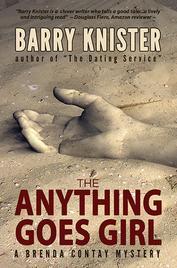
When I first decided to write a mystery series, the initial problem I faced didn’t have to do with writing. It had to do with the crime business.
I’m not talking about the myriad ways in which crime is the business of criminals; I mean the crime-fighting experts who zigzag their way through a landscape littered with clues, in search of answers. We all know who the usual suspects are: police and CSI technicians, private investigators, FBI and CIA agents, medical examiners, lawyers, computer whizzes, etc.
But what if the writer is none of these things, and has no connections with such people?
In short, my challenge as a college English teacher was to find a way to write engaging mystery novels, but without having to act as though I knew what I definitely didn’t—methods of crime detection, the law and law enforcement, medicine, etc.
The author of the first-rate website you are reading, Elizabeth Spann Craig has come up with clever answers to the problem: the crime detectors in her cozy mysteries are amateur sleuths. They are barbeque cooks, bridge players, beauticians and quilters—small-town southern women whose skills are unrelated to the crime business, but whose wit and curiosity are equal to the task of tracking down criminals.
My own solution in The Anything Goes Girl was to create a central character who’s failed at most everything in her life. But almost by chance, Brenda Contay finds herself on TV–and she turns out to be good at shoot-from-the-lip broadcasting. When the story opens, she’s become a Detroit TV station’s popular Lightning Rod reporter.
The trouble is, Brenda is ashamed of what she does. Being successful can’t keep her from feeling tacky and humiliated about reporting on the sleazy underbelly of society. Yes, she was the “anything goes girl” in college, but she has standards.
But Brenda’s on-air stories aren’t what my novel series is about. Like Elizabeth Spann Craig’s amateur sleuths, Brenda Contay becomes involved in crimes committed against people she knows. This personal element, not professional training, is what motivates her to pursue answers.
Stories have to take place somewhere, so in The Anything Goes Girl, Brenda’s wish to escape from tabloid TV causes her to focus on the death of an old lover. All-state swimmer Vince Soublik drowned somewhere she’s never heard of–Micronesia. It makes no sense that he drowned, so Brenda is off and running. Her journey to the Pacific reveals what happened, and drops The Lightning Rod into more trouble than she ever dreamed possible.
Why Micronesia? That’s where I served in the Peace Corps. I may not have any first-hand knowledge about cadavers or interrogating suspects, but I do know a thing or two about the Eastern Caroline Islands.
In the second mystery (soon to be released), tentatively titled Love and Death at Kettle Falls,readers learn that Brenda has reaped success by writing a book about her experiences in Micronesia. Now freed from TV, she goes fishing with three other women to Minnesota’s Voyageur’s National Park, otherwise own as the Boundary Waters.
Here again, my ignorance poses a problem: am I a Hemingway type who can speak with authority about hunting and fishing? Ask my wife that questions, then step back and watch her topple over, holding her sides. But I have been to the beautiful Boundary Waters. By making the women in my story amateurs like me in the great out-of-doors, I free myself from needing to be Mark Trail.
In other words, among the many challenges I face in writing crime novels is the ignorance factor. I don’t want to compete with skillful authors who know more than I can hope to learn. But like me, my readers aren’t likely to be experts. Maybe they will be interested in tagging along with a central character who is more like themselves than, say, Patricia Cornwell’s Kay Scarpetta, or Michael Connelly’s Harry Bosch.
Until retiring in 2008, Barry Knister taught English at Lawrence Technological University in Southfield, Michigan. He is the past secretary of Detroit Working Writers, and a past director of the Cranbrook Writers Conference. His first novel, a thriller titled The Dating Service was published by Berkley. In addition toThe Anything Goes Girl, he has also published Just Bill, a short novel about dogs and owners living on a golf course in Florida. His website is www.bwknister.com. He welcomes your messages.
The post The Ignorance Factor appeared first on Elizabeth Spann Craig.
February 18, 2014
Assessing Pros and Cons of Outlining
By Elizabeth S. Craig, @elizabethscraig
It must have been 2011 when I was first asked to write an outline of a book for an editor. At that point I’d written four or five books with no outline at all and the request completely freaked me out, although I tried not to let on. I handed in an outline that was something like 20 pages long and probably took me as long to write as a book would have.
At that point, I decided I’d outline just that series, just for that editor (Southern Quilting Mysteries) and use my regular, organic process for my Memphis Barbeque series (Penguin, but different editor) and my Myrtle Clover series (self-pubbed).
That was when some sort of curse kicked in. I managed to mangle an organic draft of Rubbed Out (Memphis book 4) and Body in the Backyard (Myrtle Clover book 4) immediately after that. They were riddled with plot holes, inconsistent characters, lack of motivation…a real mess. Rubbed Out was a particular emergency since I had very little time to fix it. I scrapped what I’d written, sketched out a very rough outline for the rest of the story, and pull a successful book out of it. Body in the Backyard took so long to fix that I decided I was giving up on being a pantster. It was a good run. I’d had fun. But with my crazy production schedule, I’d left myself no room for error. That was basically it…I didn’t have time to screw up now.
So now I’m counting the books I’ve outlined. I think I’m at eight books now. And yet…I still have a love-hate relationship with it. Am I more efficient, though? Without question. I was plenty efficient when I could organically write an organized, logical first draft by making it up as I went along. The problem was that I couldn’t count on my ability to do that.
I think the last time I assessed this outlining process was last May. Some of the things I discovered then are the same…but I’ve made some additional discoveries, too. Some good, some bad.
Unexpected Benefits to Outlining:
The ability to pick immediately back up after taking a break from a book. I went to Africa this summer and then came back to a hospitalized family member. And I picked right back up with my project without missing a beat.
Speed when jumping between series (gained only if outlining immediately after finishing a book in that series).
Clarity of story arc, character arc, and (purely for mystery writing) more methodical placement of clues and red herrings.
I start the book with a better understanding of who the characters are.
I actually get a better sense of what subplots would work with the story before I start (I don’t usually include subplots on my outlines…don’t pass them by the editor, either).
I haven’t run into plot holes since starting to outline.
Cover designer and copywriters can come up with back cover copy and covers (trad pub and self pub) before I’ve even finished the book. (This does mess with my head a little, but it’s still a benefit).
Unexpected Problems When Outlining:
Writing short. I mentioned this last May and it hasn’t fixed itself. I write so short when I outline. Ridiculously short. I frequently have to add 5,000 words or more.
Stilted scenes occasionally…characters, dialogue, entire scenes will read flat and have to be fluffed up later.
Sometimes…a bit of the spark is gone for me as I write. It’s not quite as fun. I can be less enthusiastic about sitting down at the computer.
The important thing to remember when we’re thinking about our processes is—do what works for us. Who cares what other people are doing? But…have you found your ideal process yet? So, are you a pantster? Outliner? Have you ever switched? What are your thoughts?
The post Assessing Pros and Cons of Outlining appeared first on Elizabeth Spann Craig.
February 16, 2014
Ask Questions to Find Your Story
I ask a lot of questions in my line of work as a professional manuscript critiquer and copyeditor. Sure, I also give a lot of suggestions and fix badly constructed sentences. But it’s the questions that get to the heart of the story. Asking authors questions helps them get thinking about what they’re writing and why.
So much important information seems to be missing in so many novels—especially first novels by aspiring authors. Novel writing is tricky; there are countless essential components that all need to mesh cohesively. To me, the key to reaching that goal is to ask a lot of questions.
Questions Create Story
Starting a novel is asking a question. What if . . .? What would someone do if . . .? What if the world was like this and this happened . . .? Then those initial questions lead to more questions, which shape and bring life to characters and story. Questions are the key.
Thousands of hours of critiquing and editing has led me to notice that there are some questions I seem to ask a lot. Which tells me there are some general gaps that many writers have in common in their novel-constructing process. I thought I’d share these questions, because maybe they’ll help you as you work on your novel.
1) Where is this scene taking place? I shouldn’t have to ask this, right? The writer is thinking, Isn’t it obvious? I know where this scene is taking place.
It may surprise you to know that readers can’t read your mind. The biggest problem I see in novel scenes is the lack of sufficient information to help the reader “get” where a scene is taking place. Just a hint of setting, shown from the character’s point of view, can do wonders. And what’s usually missing is not just the locale but the smells and sounds, a sense of the time of day and year, and exactly where in the world it is.
2) How much time has passed? So many scenes dive into dialog or action without clueing the reader in on how much time has passed since the last scene. Scenes needs to flow and string together in cohesive time. It’s important to know if five minutes or five months has passed, and it only takes a few words to make that clear. Don’t leave your reader in confusion—that’s a bad thing.
3) What is your character feeling right now? This is a biggie. It alternates with “How does your character react to this?” So many times I read bits of action or dialog that should produce a reaction from the POV character, but the scene just zooms ahead with said dialog or action without an indication of what the character is feeling or thinking. For every important moment, your character needs to react. First viscerally, then emotionally, physically, and finally intellectually. If you get hit by a car, you aren’t going to first think logically about what happened and what you need to do next. First, you scream or your body slams against the sidewalk and pain streaks through your back. Keep this adage in mind: for every action, there should be an appropriate, immediate reaction. That’s how you reveal character.
4) What is the point of this scene? This is a scary question. Not for me—for the author. Because if there’s no point to a scene, it shouldn’t be in your novel. Really. Every scene has to have a point—to reveal character or plot. And it should have a “high moment” that the scene builds to.
5) What is your protagonist’s goal for the book? If she doesn’t have a goal, you don’t really have a story. The reader wants to know your premise as soon as possible, and that involves your main character having a need to get something or somewhere, do something or find something. That goal should drive the story and be the underlayment for all your scenes. That goal is the glue that holds a novel together. It may not be a huge goal, and in the end, your character may fail to reach that goal—you’re the writer; you decide. But have a goal.
I actually ask a whole lot more questions than these. And many are just as important to crafting a powerful novel. I’ve found when writing my own novels that if I just keep asking questions—the right ones—I’ll find just the right answers for that story.
If you can get in the habit of continually asking questions as you delve into your novel, you may find it will lead you to the heart of your story.
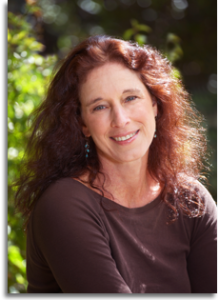 C. S. Lakin is a multipublished novelist and writing coach. She works full-time as a copyeditor and critiques about two hundred manuscripts a year. She teaches writing workshops and gives instruction on her award-winning blog Live Write Thrive. Her new book—Say What? The Fiction Writer’s Handy Guide to Grammar, Punctuation, and Word Usage—is designed to help writers get a painless grasp on grammar. You can buy it in print here or as an ebook here.
C. S. Lakin is a multipublished novelist and writing coach. She works full-time as a copyeditor and critiques about two hundred manuscripts a year. She teaches writing workshops and gives instruction on her award-winning blog Live Write Thrive. Her new book—Say What? The Fiction Writer’s Handy Guide to Grammar, Punctuation, and Word Usage—is designed to help writers get a painless grasp on grammar. You can buy it in print here or as an ebook here.
Connect with her on Twitter and Facebook.
The post Ask Questions to Find Your Story appeared first on Elizabeth Spann Craig.
February 15, 2014
Twitterific Writing Links
by Elizabeth S. Craig, @elizabethscraig
Twitterific links are fed into the Writer’s Knowledge Base search engine(developed by writer and software engineer Mike Fleming) which has over 23,000 free articles on writing related topics. It’s the search engine for writers.
Again, still struggling with downloading my scheduled tweets so my apologies for any repeats, missed links, etc. Hoping HootSuite can fix this issue soon.
Have a great week!
Books Become Decoration As E-Readers Take Over http://ow.ly/toVn1 @NewYorkObserver
10 Pro Tips for Writers Using Social Media: http://ow.ly/toWfr @mattpetronzio
What If the Writers Don’t Listen to Editorial Direction? http://ow.ly/tnKtd @ErinMFeldman
Backmatter: Are You Making the Most of Your Digital Shelf Space? http://ow.ly/tnKtP @courtneymilan
Traditional Publishers Forming Communities: http://ow.ly/toTfp @marygkeeley
10 Reasons Why Living the Writer’s Life Will Drive you to Drink: http://ow.ly/toVW9 @DanaLeipold
Is Outlining for Hacks? http://ow.ly/toT7h @mythicscribes
How many characters should a novel have? http://ow.ly/tnKb2 @standoutbooks
GoodReads Strategies to Increase Sales: http://ow.ly/tnJH0 @christinenolfi
Marginalia: The Meaning in the Margins: http://ow.ly/toSdk @fullstopmag
How to Organize Writing Ideas Using Binders: http://ow.ly/tnJSd @theWritingHabit
Is the literary world elitist? – Salon.com http://ow.ly/toXQL@magiciansbook
A Newbie’s Guide to Self-Publishing: http://ow.ly/toSqY @JulieMusil
An eye-opening publishing report–and a call for writers to organize: http://ow.ly/tB2qK @HughHowey @Porter_Anderson
How to Become a Frighteningly Good Writer: http://ow.ly/toWkz @DavGit
Overcoming Object Love: How to Write Female Leads Who Are People: http://ow.ly/toX3j @_RobbieBlair_
5 Big Screenwriting Mistakes, 5 Big Fixes: http://ow.ly/toVyu @Scriptshadow
5 Suggestions to Create an Opening That Works: http://ow.ly/tnKev @lesliemillernow
Ebooks, Paper Books, or Both: Finding the Solution that is Right for You | Wise Ink’: http://ow.ly/tl8aX
Why You Should Throw a Wrench In Your Editing Routine http://ow.ly/tj1YI @michaeldlukas
The Best Quotes From Oscar Wilde on Writing and Creativity: http://ow.ly/tl6QC @hubspot
The best fiction featuring real writers: http://ow.ly/tl923 @guardianbooks
Best Bookstores In The World 2014: http://ow.ly/tl7v7 @businessinsider
How to create value with a new thing (book apps): http://ow.ly/tl8A4 @fakebaldur
Ask The Agent: How to Perfect Your Pitch & The Low-Down on Agency Assistant Salaries: | LitReactor http://ow.ly/tl77g @breeogden
4 Questions Every Book Proposal Must Answer (to Interest an Editor!): http://ow.ly/tl9d6 @PubSmartCon
The 6 Commandments of Starting the Editing Process: http://ow.ly/tl6Z5 @Bpoelle @rahdieh
Amazon’s 100 books you need to read to live a literary life: http://ow.ly/tj1lB @cbcbooks
The Value of ARCs: http://ow.ly/tl8PV @alexbracken
6 Quick Tricks to Help You Tighten Up Your Writing: http://ow.ly/tl72e @livewritethrive @ADDerWORLD
Let This Periodic Table Of Storytelling Destroy Your Writer’s Block: http://ow.ly/tl7j6 @Gizmodo
6 Steps to Effective Writing: http://ow.ly/tl6Ol @SAlexM23
Writer’s Block, Deconstructed: http://ow.ly/tl9hl @lesliemillernow
A Tiny Scrap of Paper Offers a Glimpse Into Jane Austen’s Inspiration: http://ow.ly/tl8Fn @RachelNuwer @SmithsonianMag
What is story filler and how much is necessary? http://ow.ly/tl6AN @standoutbooks
4 Questions to Ask About Each Draft: http://ow.ly/tj26H @LizColeyBooks
7 Top eBook Blog Tour Sites: http://ow.ly/tj1dZ @gpstberg
Writing Space + Writing Routine = Progress: http://ow.ly/tq2fA @jeannevb @scriptmag
How to Create a Navigational Table of Contents in Your Ebook : http://ow.ly/tq2jQ @lisaSmason
5 Ways To Fall In Love With Your Character: http://ow.ly/tq2n1 @writermya
Supplementing Your Publisher’s Efforts: What You Can Do to Support Your Book http://ow.ly/tq2r8 @ElisabethWeed @writerunboxed
Passive Marketing (Discoverability): http://ow.ly/tq2vi @kristinerusch
Nonfiction: What You Should Know About Traditional Publishing Deals: http://ow.ly/tq2EN @NonfictionAssoc
The Inciting Incident vs The Call To Adventure: http://ow.ly/tq2NC @woodwardkaren
How To Help An Author (Beyond Buying the Book): http://ow.ly/tq2ZP @jenmalonewrites
Diagnosing Problem Stories http://ow.ly/tq39l @janice_hardy
Writing Female Characters & Archetypes: http://ow.ly/tq3d1 @dannymanus. @scriptmag
When Famous Author Promos Backfire: http://ow.ly/tq3jW @PegBrantley @LJSellers
Tips for increasing Twitter engagement: http://ow.ly/tq3ql @davgit
6 mindsets you have to dominate to become a freelancer: http://ow.ly/tq3xq @kotyneelis
The Biggest, Most Beloved Screenplays With the Simplest Mistakes http://ow.ly/tq3L6 @Eat_Sleep_TV @rejectnation
When starting with self-pub isn’t satisfying: http://ow.ly/tq40G @HughHowey
Scam-Spotting 101 | Indies Unlimited http://ow.ly/tq4au
Write Your Novels Faster: Quickly Editing and Proofing Your Novel: http://ow.ly/tresh @gpstberg
People-Powered Publishing Is Changing All the Rules http://ow.ly/trcoz @amymaeelliott @mashable
How to Cope If You Physically Can’t Write: http://ow.ly/trcz0 @zoeyclark
Why Gut Feelings Are a Writer’s Secret Weapon: http://ow.ly/trcJc @KMWeiland
Tips for those struggling with New Year resolutions: http://ow.ly/trdFG @HeatherGKelly
7 Ways to Create a Killer Opening Line For Your Novel: http://ow.ly/trdIq @BrianKlems @writersdigest
An exercise for finding your voice http://ow.ly/trdOQ @rfwriters
Book Marketing: How 4 Authors Are Finding Success With Social Media http://ow.ly/trdVQ @AndyMeekTN
Key Elements to Writing an Effective Synopsis http://ow.ly/trdXw @JordanDane
5 Tools for Building Conflict in Your Novel: http://ow.ly/tre5U @jamesscottbell @writersdigest
Fusing Action and Reaction Scenes Together: http://ow.ly/trebj
Writing a full novel after having sold it on proposal: http://ow.ly/tregZ @jennablack
Tying Your Plot Together: http://ow.ly/treAM @mythcreants
25 Lies About Publishing: http://ow.ly/trePw @DelilahSDawson
Do You Own Your Copyrights? http://ow.ly/treRB @susanspann
4 Things to Remember Before Crowdfunding Your Book: http://ow.ly/trf4w @publisherswkly
10 Ways to Get Writing: http://ow.ly/trf7c @HazelGaynor @womenwriters
11 Ways To Become an Early Riser (and Work in Time to Write): http://ow.ly/trf9O @MissJonesAndI
When to Hire a Professional: http://ow.ly/tstz9 @SpunkonaStick
How 1 single mom writer is responding to reader demands to write faster: http://ow.ly/tthsO @authorcassialeo
Why Novellas are Hot and How to Write One: http://ow.ly/ttgYm by Pul Fahey for @annerallen
How to build a fictional world: http://ow.ly/ttgeW @TED_ED @KateMessner
How to Get Reviews for Self-Published Books: http://ow.ly/tthaD @jfbookman
Writing Reality: Using Synaesthetic Imagery: http://ow.ly/ttjjP @Raishimi
What 1 writer has learned in the 2 years since his book deal: http://ow.ly/ttgEq @saskatoonauthor
Why self-publishing is the best choice for non-fiction books: http://ow.ly/ttfIw @amyshojai
Romance Novels Sweep Readers Off Their Feet With Predictability : http://ow.ly/ttinB @NPR
3 Goals for Every Character: http://ow.ly/ttfTI @mooderino
Manage Your Expectations, Indie Authors: http://ow.ly/ttfZz @RachelintheOC
8 Character Archetypes of the Hero’s Journey: http://ow.ly/tti13 @mythcreants
Writer Beware: PublishAmerica Is Now America Star Books: http://ow.ly/tthfQ @victoriastrauss
Got no writing ideas? Here’s 11 reasons why: http://ow.ly/ttiPb @mikestiles
Being a writer is hard–whether you choose trad pub or self-pub: http://ow.ly/tthKN @jimchines
Infographic shows the most common problems in screenplays: http://ow.ly/ttg4Z @io9
Is that really a publishing offer? http://ow.ly/ttfMQ @nailyournovel
Nonfiction Submission Tips: http://ow.ly/ttgz3 @ChuckSambuchino
The Literary Elitism Question | Issues on the #Ether http://ow.ly/tvzrN @EleanorCatton @Porter_Anderson @magiciansbook
How to Wreck Your Book Club in 9 Easy Steps: http://ow.ly/tvHLl @PasteMagazine
How to Make Turning Points Drive Arcs and Themes: http://ow.ly/tvHSe @jamigold
Planning to Exhibit at a Book Fair? 15 Tips: http://ow.ly/tvIgh @111publishing
1 Writer Reports on Spending A Week Getting Up At 5AM: http://ow.ly/tvIua @sarasaradee @xoJanedotcom
Some readers experiencing issues with Amazon’s review system: http://ow.ly/tvIPq @Brit_Blaise
4 Ways to Become a Better Writer, Even If You’re Short on Time” http://ow.ly/tvJld @thewritelife
7 Steps to a Successful Signing: http://ow.ly/tvJwd @amiekaufman
5 Ways We Neglect Our Own Creativity–And How to Bring It Back: http://ow.ly/tvJVp @janeporter00 @FastCompany
Be sure to keep characters in character: http://ow.ly/tvKm9 @SEvanTownsend
Making Romance Epic – 5 Tips for Writers http://ow.ly/tvKGF @mythicscribes
Traditional vs. independent publishing: production & sales timelines http://ow.ly/tvKSS @chrisrobley
Tips For A Long Term Writing Career And Writing Historical Fiction With Colin Falconer: http://ow.ly/tvKYm @colin_falconer
Use What You’ve Got—Learning to Write in Bits & Pieces of Time: http://ow.ly/tvLhp @EdieMelson
How To Market Your Book On A Shoestring: http://ow.ly/tvLEJ
The Value of Clocking In Time and Words: http://ow.ly/tvLIH @jodyhedlund
Avoiding Bad Punctuation Breaks in eBooks: http://ow.ly/tvM5n @ePUBSecrets
How Independent Publishers Do More With Less: http://ow.ly/tvMen @PublishersWkly
Readers don’t need retail/publisher silos and DRM: http://ow.ly/tvNrO @naypinya
A range of reactions to the @AuthorEarnings report from @HughHowey: http://ow.ly/tCNVS @Porter_Anderson
The post Twitterific Writing Links appeared first on Elizabeth Spann Craig.
February 13, 2014
Genre-Blending—Adding Elements of Another Genre to Our Story
By Elizabeth S. Craig, @elizabethscraig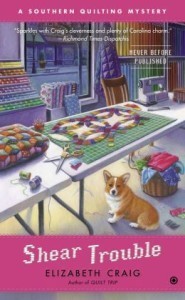
Last year, I received a contract extension for my Southern Quilting mysteries—Penguin wanted two more books. So I knew that the series would last through 2015 and then would be up for consideration again. I started writing the book that’s coming out this August, Shear Trouble.
I was about to work on subplots for the story when I got an email from a reader in South America. She’s what many writers call a “True Fan.” True Fans have been defined by former Wired editor Kevin Kelly as:
“A True Fan is defined as someone who will purchase anything and everything you produce. They will drive 200 miles to see you sing. They will buy the super deluxe re-issued hi-res box set of your stuff even though they have the low-res version. They have a Google Alert set for your name. They bookmark the eBay page where your out-of-print editions show up. They come to your openings. They have you sign their copies. They buy the t-shirt, and the mug, and the hat. They can’t wait till you issue your next work. They are true fans.”
It’s said that you only need 1000 True Fans to be a long-term success. So when True Fans write me (and frequently, they’re the only ones who write me), I pay attention. She said some nice things about my books, being extremely specific about the elements she liked. And then she stated that “it feels that it’s time for Beatrice to start dating Wyatt.”
Beatrice is my sleuth, my protagonist in the Southern Quilting mysteries and her friend is Wyatt. I have been moving their relationship along very slowly. I don’t consider myself particularly adept at writing romance and I’d originally thought of their story as a subplot that was somewhat incidental to the mysteries. But my editor keeps reminding me that, as writer Jeff Cohen put it, the “The crime is the bait; it’s what Alfred Hitchcock called “the MacGuffin,” something the people in your book are desperate about but the reader should find secondary. Your characters are first.”
This was the first of a couple of messages I received from readers regarding Beatrice and Wyatt.
So…I needed a subplot. My readers wanted a romance. I set about figuring out how to make it work and making sure that it would work so that it would be the best thing for the story. I’d uncovered some interesting posts in the past on genre-blending.
Writer Nicola Morgan had three questions to ask when considering genre-blending:
1. Are the lovers of one genre likely to want to read the other genre at the same time?
2. Is it possible that many lovers of one really don’t like the other? Enough to be put off?
3. And, if so, are the dissenters likely to scupper the chances of your cross-genre book by simply not buying it?
Mystery and romance are commonly mixed together—in everything from police procedurals to cozy mysteries, so no problem there. And readers were clearly asking…actually asking, yes…for this subplot to proceed.
Writer’s Digest also had a helpful article by writer Michelle Richmond: “How to Write and Sell a Cross-Genre Novel.” Her three points:
“Recognize your primary genre—and use it as your compass.
Draw on your strengths as a writer, regardless of genre.
Create characters that defy genre conventions.”
So I knew my strengths as a writer and I knew what I was experienced at writing. I was interested in branching out a little and didn’t mind trying something new as long as it didn’t mean I was going to fall on my face while doing it or ruin a mystery.
That’s when I decided to, yes, have the characters start functioning as a couple—but also use that relationship as a way to build tension and conflict and even humor into my story. That’s what I’m better at writing. That’s what I was more confident I could pull off.
I wrote in the subplot and turned the manuscript over to my editor. I’m curious to see if she thinks what I wrote worked—I did end up feeling good about it and how the storyline meshed with the mystery. Ultimately, it will be up to the readers to decide if I hit all the right notes.
I honestly think that most books do genre-blend…at least to a small degree. What elements of other genres have you added to your books? How did you integrate them seamlessly into your story?
The post Genre-Blending—Adding Elements of Another Genre to Our Story appeared first on Elizabeth Spann Craig.


